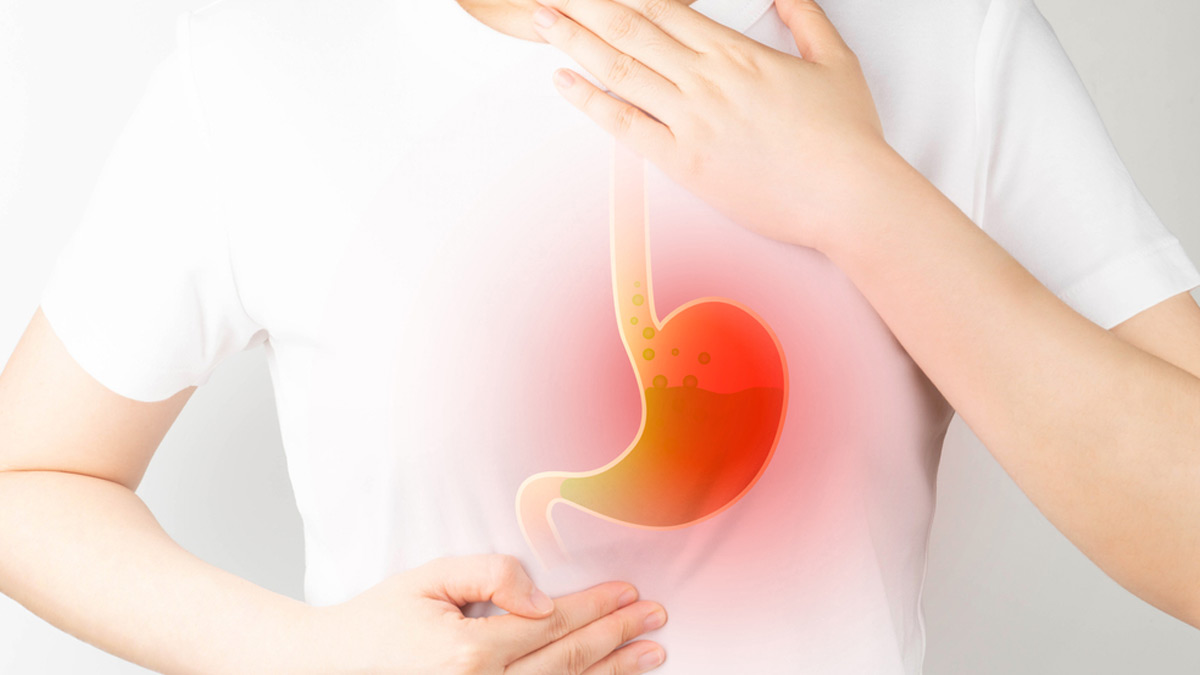
Obnoxious eating habits, untimely meals and erratic lifestyles are some of the highlighted causes of gut-related concerns. Additionally, minimal physical activity makes it worse.
Not keeping a check on basic lifestyle standards is a clear invitation to gastrological problems leading to major chronic conditions. It all starts with a mere heartburn or acid reflux. You might wonder, aren’t both the same?
Table of Content:-
To resolve this confusion, Only My Health team interacted with Dr Pavan Dhoble, Consultant – Gastroenterologist, P. D. Hinduja Hospital and Medical Research Centre, Mumbai.
What Is Acid Reflux?

Explaining the condition, Dr Dhoble said, “Acid reflux, also known as gastroesophageal reflux (GER), occurs when the stomach acid flows backward into the oesophagus. A ring-like muscle called the lower esophageal sphincter (LES) acts as a valve that opens to allow food into the stomach and closes to prevent stomach acid from flowing back into the oesophagus. When the LES doesn't function properly or weakens, stomach acid can flow back into the oesophagus, causing irritation.”
Dr Dhoble listed down the symptoms of acid reflux as heartburn, regurgitation, chest pain, difficulty in swallowing and sour taste in the mouth.
What Is Heartburn?
“Heartburn is a symptom of acid reflux and gastroesophageal reflux disease (GERD). It is a burning sensation or discomfort that typically rises from the stomach to the chest and sometimes the throat. The sensation is often described as a burning feeling behind the breastbone, and it may be accompanied by a sour or acidic taste in the mouth,” Dr Dhoble clarified.
Also read: How To Differentiate Between Heartburn And A Heart Attack? Know From Expert
Difference Between Acid Reflux and Heartburn?
Being related to each other, heartburn and acid reflux are different aspects of the same underlying condition. Dr Dhoble gave a precise detail about the difference between Acid Reflux and Heartburn.
Acid Reflux
- Physiological condition where stomach acid flows back in oesophagus
- Generally occurs when the LES does not close properly or it is weakened
- Heartburn is one of the many symptoms of acid reflux
Heartburn
- Symptom of acid reflux
- Burning sensation or discomfort in the chest which rises from the stomach to chest and sometimes even till the throat
- Not everyone with acid reflux experiences heartburn
What Is GERD?

These two related conditions do not end here, they can lead to the development of another condition called GERD. Let’s understand what GERD is from Dr Dhoble.
“Acid reflux and heartburn are closely related to the development of gastroesophageal reflux disease (GERD). GERD is a more severe and chronic form of acid reflux, and it can lead to various complications if left untreated,” elaborated Dr Dhoble.
How Do Acid Reflux And Heartburn Cause GERD
1. Frequent and Prolonged Acid Exposure
In people with regular acid reflux problems, the LES may not function properly leading to back flow of stomach acid. This frequent exposure to stomach acid can give rise to inflammation of the esophageal lining.
2. Esophageal Irritation and Damage
Repeated exposure to stomach acid can cause damage to the lining of the oesophagus. In course of time, this can lead to conditions such as esophagitis, which is inflammation of the oesophagus.
3. Formation of Esophageal Strictures
Chronic inflammation and damage to oesophagus may result in formation of scar tissue. Scar tissue can lead to narrowing of the oesophagus, a condition called esophageal stricture, which can lead to difficulty in swallowing.

4. Barrett's Oesophagus
When normal cells lining the oesophagus are replaced by cells more similar to those lining in the intestines, it is called Barrett’s oesophagus. Chronic GERD can lead to Barrett’s oesophagus. Barrett’s oesophagus is considered a precancerous condition, increasing the risk of esophageal cancer.
5. Respiratory Complications
Stomach acid that reaches throat and respiratory tract can lead to respiratory issues like coughing, wheezing and aspiration pneumonia.
6. Other Complications
Chronic GERD can lead to many complications like dental problems, chronic cough and laryngitis.
Not everybody with acid reflux or heartburn are bound to develop GERD. The severity of GERD can vary from person to person. Dr Dhoble advised, “Lifestyle modifications, dietary changes, medications, and, in some cases, surgical interventions may be recommended to manage GERD and prevent complications. Individuals experiencing persistent or severe symptoms should seek medical advice for proper diagnosis and treatment.”
Also read: GERD: What Are Its Underlying Symptoms?
Lifestyle Changes

A study by Sage Journals states, “Poor habits can worsen gastroesophageal reflux disease (GERD) and reduce treatment efficacy. Few large-scale studies have examined lifestyle influences, particularly eating habits, on GERD.”
Dr Dhoble listed down some lifestyle changes to manage GERD.
- Avoid trigger foods and drinks that can worsen your symptoms like spicy foods, fried foods, citrus fruits, tomatoes, chocolate, tea, coffee and alcohol.
- Eat smaller meals and eat frequently to avoid large meals
- Avoid lying down immediately after a meal
- Try to keep a gap of 2-3 hours between your last meal and bedtime
- If overweight or obese, losing weight can reduce the pressure on stomach and decrease the frequency of acid reflux
- Elevate the head of the bed by 6-8 inches so that the stomach acid does not flow back in your oesophagus when you’re sleeping
- Quit smoking as smoking can weaken your LES
Home Remedies
- Drinking aloe vera juice can give relief from GERD symptoms.
- Ginger contains anti-inflammatory properties which can help reduce inflammation in the throat, so drinking ginger tea can help you alleviate digestive comfort. Dr Dhoble advises drinking ginger tea before meals.
- Chewing sugar-free gum after meals can stimulate saliva production, which helps in neutralising stomach acid.
Bottomline
Dr Dhoble concluded by saying, “Always consult with your healthcare provider before starting any new treatment or making significant changes to your diet or lifestyle. They can provide guidance based on your specific health condition and needs.”
Also watch this video
How we keep this article up to date:
We work with experts and keep a close eye on the latest in health and wellness. Whenever there is a new research or helpful information, we update our articles with accurate and useful advice.
Current Version